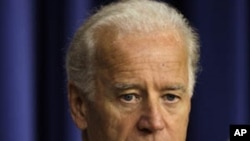Steps the United States is taking to get its fiscal house in order will be a key topic during a three-country Asia tour by Vice President Joe Biden. Mr. Biden sets off Tuesday on the trip to China, Mongolia and Japan.
U.S. officials say Mr. Biden will use his talks with Chinese leaders, including Vice President Xi Jinping who is anticipated to succeed President Hu Jintao next year, to emphasize that the United States is moving firmly to tackle its fiscal problems.
During the difficult and divisive negotiations between President Barack Obama and Congress for a debt and deficit compromise, China's state-run Xinhua news agency said political battles in Washington were jeopardizing the global economy.
Briefing reporters, Treasury Department Under Secretary for International Affairs Lael Brainard said Biden will talk about "the very strong deficit reduction package" President Obama signed into law.
Saying the United States "has the capacity, the will, and the commitment" to tackle its fiscal and economic challenges, Brainard noted the stake that China has in a successful U.S. fiscal strategy, namely more than $1 trillion invested in treasury securities. "There continues to be extremely strong investor demand for U.S. treasury securities, recognizing that this market continues to be the deepest, most liquid in the world. And I think recognition widely in China and around the world is that the U.S. economy remains the most flexible and the most innovative," he said.
Brainard said Biden's visit will also be an opportunity discuss key bilateral economic issues. These include the need to continue moving away from protectionism, further steps to allow China's currency to appreciate against the dollar and the need to reorient China's economy to be based more on domestic demand than on exports.
The invitation to Biden to visit China was issued by President Hu during his Washington visit in January. In addition to visiting Beijing, where he will meet U.S. and Chinese business leaders, Biden is expected to deliver a speech on Sino-American relations at Sichuan University in Chengdu.
National Security Adviser to the vice president, Tony Blinken, says Biden is well-positioned to deliver this message. "As two great powers and global actors in this century, China and the U.S. face many similar challenges and share many common responsibilities. And the vice president and president have the conviction that the more we can act on those challenges and responsibilities together, then the more the world will benefit," he said.
Blinken says one of the main purposes of the visit is to get to know China's future leadership and build a relationship with Vice President Xi.
Daniel Russel is Senior Director for Asian Affairs on the National Security Council. "This will be the first time that a very senior U.S. official has spent a substantial amount of time with Vice President Xi Jinping," he said.
On human rights issues, NSC official Daniel Russel says Mr. Biden will continue to reinforce the U.S. view that there is "great value" in China renewing dialogue with representatives of the Dalai Lama.
President Obama and the Dalai Lama, both Nobel Peace Prize laureates, met at the White House last month. China criticized the meeting, calling it interference in China's affairs.
Mr. Biden will also visit Mongolia, where he will be the first U.S. vice president to visit there since 1944. Talks in Mongolia will focus on the country's transition to democracy, and expanding economic and defense cooperation with the United States. Mongolia's president visited the White House in June.
In Japan, the vice president's talks will focus on recovery efforts after the so-called "triple disaster" of the earthquake, tsunami and nuclear accident as well as alliance and security issues, including North Korea.
The Biden trip to Asia kicks off what U.S. officials describe as a busy diplomatic calendar of Asia-Pacific events in coming months.
President Obama will host the Asia-Pacific Economic Cooperation summit in Honolulu in November, and then travel to Bali for the East Asia Summit.
US Vice President to Discuss Economic Issues in China
- By Dan Robinson





